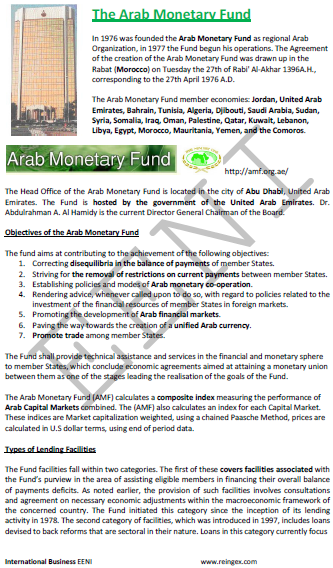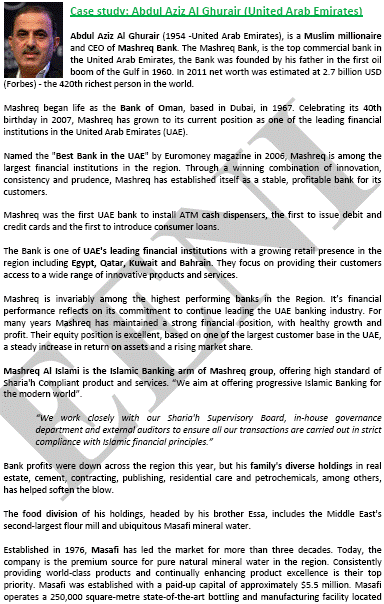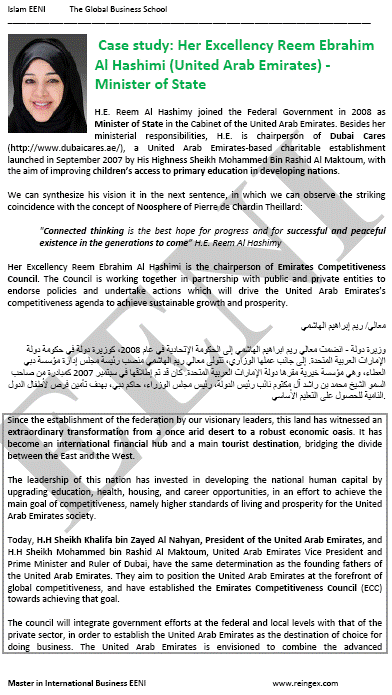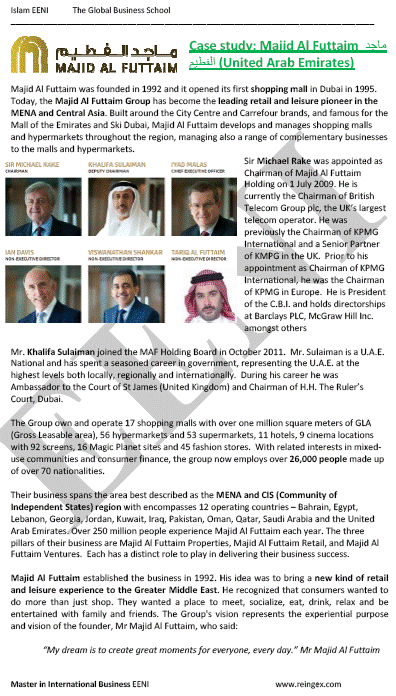Business in the Emirates, Dubai

Abu Dhabi Dubai. Invest in the United Arab Emirates (Foreign Trade). Sheikha Lubna
Introduction to the United Arab Emirates (Middle East)
- Business in Dubai and Abu Dhabi
- Economy of the Emirates;
- Economic Profile of the seven emirates: Abu Dhabi, Ajman, Dubai, Fujairah, Ras al-Khaimah, Sharjah, and Umm al Kaiwain
- International Trade of the Emirates
- Investment in the United Arab Emirates (UAE)
- Business Opportunities in the UAE
- Set up a business in Dubai-United Arab Emirates
- Access to the Emirati market
- Business Plan for the United Arab Emirates
Emirati Arab Funds:
Emirati Businesspeople and Companies:
- Abdul Aziz Ghurair
- Amina Al Rustamani
- Majid Al Futtaim
- Shaikha Al Maskari
- Sharjah World Book Fair
- Mubadala Development Company
The objectives of the subject “International Trade and Business in the United Arab Emirates (UAE)” are the following:
- To analyze the Emirati Economy and Foreign Trade
- To know the business opportunities in the United Arab Emirates
- To explore the Emirati trade relations with the country of the student
- To know the Emirati Trade Agreements
- To examine the profile of Emirati businesspeople and companies
- To know the Emirati development funds
- To develop a business plan for the Emirati market

The Subject “Foreign Trade and Business in the United Arab Emirates” belongs to the following Online Programs taught by EENI Global Business School:
Doctorate: Islamic Business, World Trade.
Masters: International Business, Foreign Trade.
ماجسـتير تنفيذي في التجارة الخارجية ،التسويق الدولي والتدويل
Languages:  (or
(or  Emirats
Emirats  Emiratos).
Emiratos).
- Credits of the subject “Doing Business in the United Arab
Emirates”: 2

- Duration: two weeks

International Trade and Business in the United Arab Emirates

Transport and Logistics in the United Arab Emirates. Access to the:

Emirati Preferential Access and Trade Agreements:
- The United Arab Emirates and the Arab Economic Area
- Gulf Cooperation Council (GCC)
- India-United Arab Emirates (GCC) Agreement
- EU-United Arab Emirates (GCC) Agreement
- Australia-GCC Agreement
- EFTA-GCC
- Gulf Cooperation Council (GCC)-Singapore Agreement
- Indian-Ocean Rim Association
- Islamic Trade Preferential System
- Trade Agreements with India and the EU
- Morocco-United Arab Emirates Agreement
- Greater Arab Free-Trade Area (GAFTA)

- WTO
- Agreement on Sanitary and Phytosanitary Measures
- GATS
- Agreement on Technical Barriers to Trade
- Agreement on Preshipment Inspection
- Agreement on Safeguards
- Trade Facilitation Agreement
- WCO
- IRU
- TIR Convention
- Guidelines on Safe Load Securing for Road Transport
- IMO
- Convention for Safe Containers
- Istanbul Convention
- Customs Convention on Containers - not a member

- Islamic Development Bank
- Economic Commission for Western Asia (ESCWA)
- OIC
- Committee for Economic Cooperation
- Islamic Chamber of Commerce
- Islamic Centre for Development of Trade
- Economic Centre for Islamic Countries
- Arab League
- Summit of South American-Arab Countries
- Asia-Middle East Dialogue
- Arab Trade Financing Programme
- Arab Development Funds
- Afro-Arab Cooperation
- Arab Bank for Africa (BADEA)
- Arab Gulf Programme (AGFUND)

- Asia Cooperation Dialogue
- UN
- WB
- WTO
- IMF
- The United Arab Emirates (UAE) is a constitutional federation of seven emirates; Abu Dhabi, Dubai, Sharjah, Ajman, Umm al-Qaiwain, Ras al-Khaimah and Fujairah
- The United Arab Emirates federation was formally established in 1971
- Emirati population: 5.8 million people
- Emirati Currency: Dirham
- The United Arab Emirates is an elective and Presidential Federal Constitutional Monarchy
- Capital of the United Arab Emirates: Abu Dhabi
- Largest city of the United Arab Emirates: Dubai
- Area of the United Arab Emirates: 83,600 km²
- Independence of the United Arab Emirates: 1971 (from the UK)
- Official language of the United Arab Emirates: Arabic
- Borders of the United Arab Emirates: Oman and Saudi Arabia.
Sample of the Subject:
Religion in the United Arab Emirates:
- Sunni Islam
- Fiqh (Islamic Jurisprudence): Maliki

The United Arab Emirates belongs to the Arab Economic Area.

The economy of the United Arab Emirates is 62.8% free (63rd freest economy in the World - Heritage Foundation).
- The United Arab Emirates is a Frontier Market
- The United Arab Emirates (UAE) ranks seventh in the Middle East/North Africa region (MENA)
- Notwithstanding the effects of the global financial crisis, the economy of the United Arab Emirates remains robust, protected by significant foreign financial assets obtained in the age of high petroleum revenues
- Petroleum revenue of the United Arab Emirates represents a small proportion of the GDP
- The Logistics sector of the United Arab Emirates represents 10% of the non-petroleum GDP
- The Port of Dubai are the third largest re-export hub (after Hong Kong and Singapore)
- The main economic sectors of Dubai are tourism, services (Information Technology, international logistics, and international finance)
- New Dubai International Financial Centre
- The currency of the Emirates: UAE dirham (AED)


International Trade of United Arab Emirates.
As the leading regional international hub, the Emirate of Dubai offers access to a regional and local market of exceptional business potential for foreign companies:
- A large market: 17 billion dollars in imports annually
- A growing market: imports of Dubai have duplicate since 1989
- A strategic location at the heart of one of the richest regions in the World, linked by 170 shipping lines and 86 airlines
- A diversified market: business opportunities for products and services exporters
- Dubai is an open market without exchange controls, quotas or international trade barriers
Dubai presents huge business opportunities for the international trade, transport and regional distribution, manufacturing, and regional branch.
EENI delivers to HRH Prince Alwaleed bin Talal a Master Honoris Causa.




